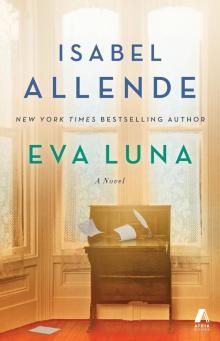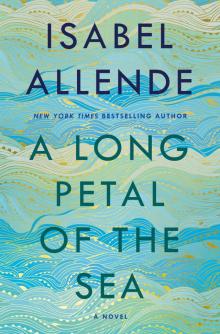- Home
- Isabel Allende
A Long Petal of the Sea Page 9
A Long Petal of the Sea Read online
Page 9
Frustration flared up in her stomach; she could feel heartburn in her chest. I’m always the one who has to give in, what Isidro wants he gets: it’s him first, second, and third—that’s what he tells me, as if it were some kind of joke, and I accept it! What wouldn’t I give to be a widow! thought Laura. She had to combat this recurrent temptation with prayers and penitential acts. To wish for another person’s death was a mortal sin; Isidro might be short-tempered, but he was an excellent husband and father. He didn’t deserve this perverse wish of his wife, the woman who, when they married, had sworn at the altar to be loyal and obedient. “I’m crazy as well as fat,” she sighed, and all of a sudden that conclusion seemed amusing. She couldn’t suppress a contented smile, which her husband took to be one of acquiescence.
“That’s what I like to see, darling,” he said, singing under his breath as he headed for the bathroom.
* * *
—
OFELIA ENTERED HER PARENTS’ suite without knocking. At nineteen, she was still an impetuous girl. When is she going to grow up? her father would sigh halfheartedly, because she was his pampered child, the only one who was as daring and stubborn as he was, someone impossible to subdue. She had been out of her depth at school, and after failing her final exam was only allowed to graduate because the nuns wanted to get rid of her. She had learned very little during her twelve years’ education, but managed to hide her ignorance by being so beguiling, by knowing when to keep quiet, and thanks to her ability to observe. Her memory had not been good enough for her to pass her history exam or to learn the times tables, but she knew the words to all the songs played on the radio. She was absentminded, flirtatious, and too pretty: her father was afraid she would be easy prey for unscrupulous men. He was sure that all the officers on board, and half the male passengers, including the elderly ones, had her in their sights. More than one had commented how talented his daughter was, referring to the watercolors Ofelia painted on deck, but they did not crowd around her to admire her banal little compositions. Isidro was hoping to see her married soon, when she would become the responsibility of Matias Eyzaguirre and no longer his, so that he could breathe more easily. Although it would be better for her to wait awhile, because if she married very young, like her sisters, within a few years she would turn into an embittered matron.
Coming from Chile, in the far south of America, the journey to Europe was a long, expensive odyssey that few families could afford. The del Solar family were not among the truly rich, as they might have been had Isidro’s father left what he himself had received rather than throwing it away entirely before he abandoned his family, but they were comfortably well-off nevertheless. However that might be, social position depended less on money than on lineage. Unlike many rich families who still had their provincial mentalities, Isidro thought it was important to see the world. Chile was an island, bounded to the north by the most inhospitable desert, to the east by the impenetrable cordillera of the Andes, to the west by the Pacific Ocean, and to the south by the frozen continent of Antarctica. This explained why Chileans spent their time navel-gazing, while beyond their borders the twentieth century went galloping along. To Isidro, travel was a necessary investment. He had sent two of his sons to the United States and Europe as soon as they were old enough, and would have liked to do the same for his daughters, but they married before he found the right moment to do so. He was determined not to make that mistake with Ofelia; he had to get her out of the narrow, sanctimonious atmosphere in Santiago and give her at least a veneer of culture.
Secretly, he had in mind something that not even his wife knew at present: to leave Ofelia in a girls’ finishing school in London at the end of their trip. One or two years of a British education would be good for her; she could improve her English, which she had studied since childhood with a governess and private tutors, as all his children had (except, of course, Leonardo). English could well be the language of the future, unless Germany took over Europe. A school in London was what his daughter needed before she married Matias Eyzaguirre, her eternal fiancé, who was carving out a career for himself in the diplomatic corps.
Ofelia occupied the second bedroom in the suite, separated by a door from her parents. For weeks, chaos had reigned in her cabin: trunks and hatboxes lay open, while clothes, shoes, and cosmetics were strewn everywhere, along with tennis rackets and fashion magazines. Brought up by servants, she went everywhere sowing confusion, never asking herself who picked up or sorted out the typhoon she left in her wake. At the sound of a bell, someone appeared as if by magic to attend her. That night she had rescued a flimsy, tight-fitting gown from the maelstrom. When he saw it, her father exploded with disgust.
“Where did you get that sluttish dress?”
“It’s fashionable, Papa. Do you want to see me in a nun’s habit, like Aunt Teresa?”
“Don’t be impertinent. What would Matias think if he saw you like that?”
“He’d stand there with his mouth wide open, like he always does. Don’t get your hopes up, I’m never going to marry him.”
“Well then, you shouldn’t keep him hanging on.”
“He’s so devout, Papa.”
“Would you prefer him to be an atheist?”
“Not in a month of Sundays, Papa. Mama, I came to ask if I could borrow Grandma’s necklace, but I see you’re already wearing it. It looks wonderful on you.”
“You take it, Ofelia, you’ll show it off much better than I will,” her mother said quickly, raising her hands to the clasp.
“Don’t be silly, Laura! Didn’t you hear that I want you to wear it tonight?” her husband cut in.
“What does it matter, Isidro? It will look better on her…”
“It matters to me! That’s enough. Ofelia, wear a shawl or cardigan, that neckline is too low,” he ordered. He couldn’t forget how embarrassed he had been during the masked ball held when they crossed the equator, when Ofelia appeared as a harem girl, wearing a veil and a revealing pair of pajamas.
“Just pretend you don’t know me, Papa. Luckily I don’t have to sit at your table with those boring old crocks. I hope I’m with some good-looking young fellows…”
“Don’t be so vulgar!” her father managed to exclaim before she swept out of the room, twirling like a flamenco dancer.
To Laura and Ofelia del Solar the captain’s dinner seemed endless. After the dessert—a volcano of ice cream and meringue with a lit candle in the center—the mother retired to her suite with a migraine, while her daughter made up for it dancing in the ballroom to soaring trumpets. She overdid the champagne and ended up in a corner of the deck kissing a Scottish officer with carrot-colored hair and wandering hands. Her father swooped down to rescue her at the last minute. “For God’s sake, the trouble you cause me! Don’t you know that rumor has wings? You’ll see, Matias is going to hear about this before we even dock in Liverpool!”
* * *
—
IN THE DEL SOLAR house on Calle Mar del Plata back in Santiago, a sense of perpetual vacation floated in the air. The master and mistress had been away for four weeks, and not even the dog was missing them. Their absence didn’t change the routines or lighten the servants’ tasks, but none of the servants was in any great hurry. The radios poured out soap operas, boleros, and soccer. There was time for siestas. Even Leonardo, who normally clung to his mother, seemed happy and had stopped asking for her. This was the first time they had been apart, and far from regretting it, Baby took advantage to explore all the forbidden nooks and crannies of this three-story house: the basement, garage, cellar, and attic.
Felipe, the eldest son, who had been left in charge of the house and his younger brother, took his responsibilities lightly, because he was not cut out to be the head of the family, and his mind was on more interesting affairs. The burning issue of political life in Chile at the time was the question of the Spanish refugees, and so he could
n’t care less if they served watery soup or crab at table or if Baby slept with the dog on his bed. He didn’t check the household expenses, and if he was asked for instructions, told the staff they should do as they always did.
Juana Nancucheo, of mixed criollo and Mapuche heritage from the deep south, was a woman of indeterminate age. Short of stature and as solid as the ancient tree trunks of her native forests, with a long black plait and olive skin, she was rough in manner and steadfastly loyal, and had been in charge of the household since time immemorial. She strictly supervised the three maids, cook, laundress, gardener, and the man who polished the floors, fetched the firewood and coal, looked after the hens, and did all the heavy work (nobody could remember his name: he was simply “the little fellow who did all the chores”). The only one to escape Juana’s control was the driver, who lived above the garage and received orders directly from the masters, although in her view this led to many abuses. She had her eye on him: she was sure he couldn’t be trusted, that he smuggled women up to his room. “There are too many domestic staff in this house,” Isidro would often say. “So who are you thinking of getting rid of, patron?” Juana would retort. “No one, I’m just saying it,” he would immediately bluster. He was right in a way, Juana admitted to herself: the children were grown up and several of the bedrooms had been closed off. The two elder daughters were married and had children of their own; the second son was away studying climate whims in the Caribbean, even though in Juana’s opinion there was nothing to be studied about that, you simply had to put up with it. Felipe lived in his own house. The only ones left were the youngest daughter, Ofelia, who was going to marry the agreeable young Matias—such a gentleman, so much in love—and Baby, her little angel, who was going to stay with her forever, because he would never grow up.
Her master and mistress had traveled abroad before, when the children were younger, and before Leonardo was born, and she had been left in charge of the house. On that occasion she had carried out her duties without anyone complaining, but this time they had decided to leave Felipe in charge, as if she were a useless idiot. All those years serving the family, she thought, and they repaid her in such a shabby fashion. Tempted as she was to gather her things and leave, she had nowhere to go. She must have been six or seven when she was given to Laura’s father, Vicente Vizcarra, in payment for a favor. In those days, Señor Vizcarra traded in hardwoods—although by now there was nothing left of the fragrant forests of the Mapuche region, chopped down with axe and saw and replaced by nondescript trees planted in rows like soldiers, destined for paper mills. Juana was a barefoot youngster who understood no more than a few words of Spanish: her mother tongue was Mapudungun. Although she looked to him like a young savage, Vizcarra accepted her, because to refuse would have been a tremendous insult to his debtor. He took her back to Santiago with him, and handed her over to his wife, who in turn passed her on to the maids for them to train the girl in basic housework. Juana learned everything else for herself, her only schooling being her ability to listen and her willingness to obey. When Laura, one of the Vizcarra family daughters, married Isidro del Solar, Juana was dispatched to be their servant. She calculated that this must have been when she was about eighteen, although her birth had never been registered and so legally she didn’t exist.
From the outset Isidro and Laura del Solar made her the housekeeper, for they trusted her blindly. One day she plucked up the courage to stammer out a request that her employers could perhaps pay her something, not a lot, and forgive her for asking, but she had a few expenses, a few needs…
“Goodness me, you’re part of the family, why would we pay you?” was their answer.
“I’m sorry, but I’m not part of the family, I’m only part of the household.”
And so for the first time Juana Nancucheo began to receive money, which she spent on candies for the children and a new pair of shoes every year; the rest, she saved. Nobody knew the members of the family better than she did; she was the guardian of all their secrets. When Leonardo was born, and it was obvious from his sweet moon face that he was different, Juana swore she would live long enough to take care of him until his dying day. Baby had heart problems and, according to the doctors, wasn’t going to live long, but Juana’s instinct and affection for him made her reject that diagnosis. With great patience she taught him to eat by himself and to use the toilet. Other families hid any children they had resembling him, ashamed as if it was a punishment from God, but thanks to Juana, it wasn’t the same for Leonardo. When he was clean and not shouting or screaming, his parents presented him as simply another one of their offspring.
* * *
—
FELIPE, THE DEL SOLARS’ eldest son, was the apple of Juana’s eye, and continued to be her favorite even after the birth of Leonardo, because there were different kinds of love. She thought of Felipe as her mentor, the stick she could lean on in her old age. He had always been a good boy, and to her he still was, even though now he was grown up. He was a lawyer, but reluctantly so, because his passions were art, conversation, and ideas. Nothing very useful in this world of ours, as his father often commented.
During his studies at the religious school where the children of the leading, most conservative families in Chile were educated, Felipe had taught Juana to read, write, and do sums. This created a close bond between them. Juana covered up any mischief he got into, and he kept her informed about the world outside. “What are you reading at the moment, niño Felipe?” “Wait until I finish the book and I’ll tell you—it’s about pirates” or alternatively: “Nothing that would interest you, Juana. It’s about the Phoenicians, who lived many centuries ago and who nobody cares a bit about—I don’t know why the priests teach us such stupid things.” Felipe had grown in size and years, but still went on telling her what he was reading and explaining what was going on in the world. Later on, he helped her invest her savings in shares on the stock exchange: the same ones his father, Isidro, bought. He showed some delicate touches: he would steal into her room to leave money or candy under her pillow. She was always concerned about his health, because her niño Felipe was frail, catching cold from the slightest draft and suffering from indigestion whenever he was upset or ate heavy meals. Unfortunately, her Felipe was another innocent like Leonardo, unable to see other people’s falsity and treachery. An idealist, as they say. In addition, he was so absentminded he kept losing things, and had such a gentle character that people took advantage of him. He was always lending money that nobody ever repaid, and contributing to noble causes that Juana considered pointless because the world never changes. Inevitably, he had never married: what woman would put up with his crazy ideas, they might be all right for saints, but not for any right-minded gentleman, as Juana would say.
Isidro del Solar was another one who didn’t appreciate his son’s generosity, which went beyond his charitable impulses and affected the clarity of his ideas. “One of these days he’s going to surprise us with the news that he’s become a communist,” he would sigh. The arguments between father and son were a sight to behold. They ended with slammed doors over matters that had nothing to do with the family, such as the state of the country and of the world—which according to Juana was none of their business. After one of these clashes, Felipe chose to go and live in a house he rented six blocks away. Juana was up in arms because a proper son only leaves the family home when he is married, and not before, but the rest of the family accepted it without a fuss. This didn’t mean, though, that Felipe disappeared completely: he came for lunch every day, expected his meals prepared and his clothes washed and ironed how he liked them. Juana would go to his house and supervise the work done by his two servants—a couple of lazy, dirty Indians in her view. More work for her when all was said and done: it would have been better for him to stay in his bachelor’s bed, she muttered. The feud between Felipe and his father seemed likely to go on forever, until Doña Laura suffered a serious bout of he
patitis that forced them to make up.
Juana could well recall the reason for the split between the two men: it was impossible to forget, because it shook the entire country, and was still talked about on the radio. It had happened in spring the previous year, when there had been a presidential election. There were three candidates: Isidro del Solar’s favorite, a conservative millionaire with the reputation of being a speculator; a man from the Radical Party, an educator, lawyer, and senator, whom Felipe was going to vote for; and a general who in the past had occupied the presidency as a dictator, and was running this time with the support of, among others, the Nazi Party. Nobody in the family liked him. As a boy, Felipe had a collection of lead soldiers from the Prussian Army, but he lost all sympathy for the Germans when Hitler came to power. “Have you seen the Nazis marching through the center of Santiago saluting with an arm raised in the air, Juana? How ridiculous!” Yes, she had seen them, and also knew of somebody called Hitler, because Felipe had told her about him.
“Your father was sure his candidate was going to win.”
“Yes, because here the right wing always wins. The general’s supporters wanted to stop him winning, and tried to carry out a coup. They didn’t succeed.”
“They said on the radio that some youngsters were shot down like dogs.”
“It was a handful of hotheaded Nazis, Juana. They stormed the University of Chile building and another one opposite the presidential palace. The military police and army quickly cornered them. They surrendered with their hands up, and they were unarmed, but they were shot down all the same. The authorities had given orders that none of them was to be left alive.”

 The Stories of Eva Luna
The Stories of Eva Luna The House of the Spirits
The House of the Spirits Paula
Paula Ines of My Soul
Ines of My Soul Of Love and Shadows
Of Love and Shadows Kingdom of the Golden Dragon
Kingdom of the Golden Dragon Daughter of Fortune
Daughter of Fortune City of the Beasts
City of the Beasts Maya's Notebook
Maya's Notebook Eva Luna
Eva Luna Zorro
Zorro In the Midst of Winter
In the Midst of Winter Forest of the Pygmies
Forest of the Pygmies My Invented Country: A Nostalgic Journey Through Chile
My Invented Country: A Nostalgic Journey Through Chile The Japanese Lover
The Japanese Lover Portrait in Sepia
Portrait in Sepia Island Beneath the Sea
Island Beneath the Sea The Soul of a Woman
The Soul of a Woman A Long Petal of the Sea
A Long Petal of the Sea Ines of My Soul: A Novel
Ines of My Soul: A Novel The Sum of Our Days
The Sum of Our Days